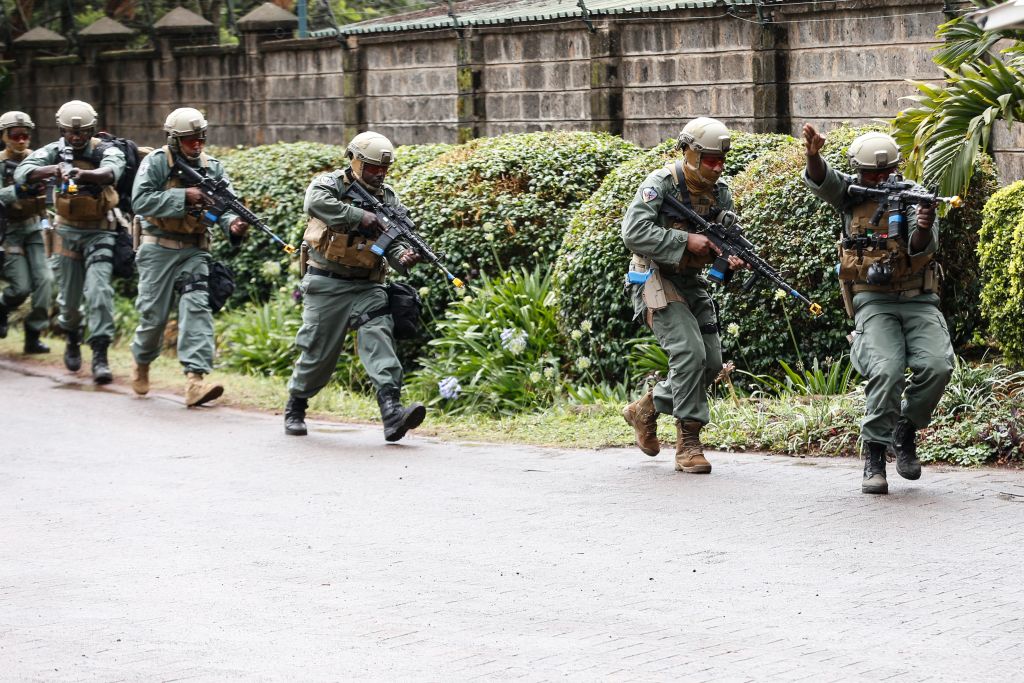ADF STAFF
More than 30 Kenyan security officers were killed by improvised explosive devices (IED) in more than 10 attacks over a three-week period in June.
Officials suspect that al-Shabaab was behind the attacks in the northeastern Garissa and Lamu counties, both of which border Somalia. The group is the main terrorist threat in Kenya and often uses IEDs in its attacks.
Several ambushes targeted Kenya Defence Forces (KDF) Soldiers, important infrastructure and a mine-resistant vehicle between June 7 and 12, according to the Institute for Security Studies (ISS). Between June 13 and June 25, attacks killed 20 KDF Soldiers, people traveling in public service vehicles, and civilians in Lamu and Mandera counties.
Al-Shabaab also claimed responsibility for assaults on two small villages in Lamu County on June 24. About 30 terrorists killed five civilians, some of whom were tied up and beheaded. The group increasingly has targeted Kenya after suffering setbacks in Somalia.
The attacks are an effort by the group to send a message “that despite being under pressure, they still have the firepower and are a force to be reckoned with,” Nicolas Delaunay, International Crisis Group director for East and Southern Africa, told Agence France-Presse (AFP). “It could also be a way of warning Kenya who has pledged to participate in the Somali government’s offensive against the Al-Shabaab.”
Al-Shabaab attacked Kenya sporadically for years, but its operations in Kenya ramped up in 2019 and early 2020. When the border with Somalia closed in 2011, the group built smuggling networks and began funding its operations by imposing taxes on traders bringing contraband into Kenya. The surging al-Shabaab attacks scuttled plans to reopen the border this year.
Kenya has beefed up its military presence to respond to al-Shabaab attacks, but the porous border lets militants sneak into the country in small numbers.
Hassan Khannenje, director of The Horn International Institute for Strategic Studies in Nairobi, said that the wave of attacks “should serve as a warning” to Kenya. “Vigilance is key,” Khannenje told AFP.
Kenyan politicians such as Dido Rasso have been debating the country’s approach to security and are calling for more funding for intelligence-gathering, witness protection and countering youth radicalization to build resilience at the community level.
Rasso urged elders and religious leaders to work with young people who are vulnerable to recruitment into the group, often by being paid to plant IEDs.
Kenyan officials also have urged people to come forward with any information about al-Shabaab. The Kenyan Witness Protection Agency’s 2023-28 strategic plan was launched in June to encourage civilians to share security-related intelligence, according to the ISS.
Supported by the United Nations Office on Drugs and Crime, the agency aims to protect people who face risk or intimidation due to cooperation with authorities.
However, the agency has a long way to go in “ensuring that its existence, mandate and new strategy are known to the public and other grassroots government security and administrative agencies,” Dominic Pkalya, a Nairobi-based expert in preventing and countering violent extremism, told the ISS.
Pkalya said interagency cooperation with the National Counter Terrorism Center and other security agencies will be key to the plan’s success.
Analysts have argued for greater investments to improve socioeconomic conditions in areas targeted by al-Shabaab to build trust between civilians and security forces.
“Kenya also needs to strengthen community policing structures and invest in coordinated multi-agency and cross-border intelligence-gathering,” wrote Isel Ras, an ISS research consultant. “County governments should be given more decisive roles in co-funding local police reservist patrols, sensitizing communities and allocating cash to projects that tackle the drivers of radicalization and recruitment into al-Shabaab.”

